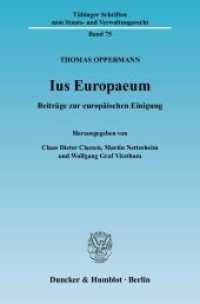- ホーム
- > 洋書
- > 英文書
- > History / World
基本説明
Covering from the fifteenth to the twenty-first century, this book explores Burma, Cambodia, Laos, Thailand, Vietnam and China's Yunnan province.
Full Description
On The Borders of State Power explores the changing nature, meaning and significance of international borders over time in the area referred to today as the Greater Mekong Sub-region, incorporating Burma, Cambodia, Laos, Thailand, Vietnam and China's Yunnan province.
An international line up of contributors examine the changing nature of borders over time, using examples from the 15th to 21st centuries and engage with contemporary literature on globalisation, particularly as it applies to borders and the nature of state power. What the book finds is that there is far greater diversity in terms of the importance of borders across time than is commonly thought. Thus, borders commonly thought to be closed are often more open, open borders are found to be more restricted, while pre-colonial frontiers, which are usually viewed as relatively unimportant compared with the colonial era, are in fact found to have been more closely governed. Looking at the contemporary period, the book shows how economic liberalisation - or so-called cooperation between the Mekong states in the post-Cold War period - has been accompanied not by the retreat of the state but rather by its expansion, including in ways which frequently impose greatest restrictions on the poor and marginalised.
Incorporating work by both historians and social scientists this book is a valuable read for those interested in the politics, development and geography of Southeast Asia.
Contents
Acknowledgements. About the Contributors 1. Introduction - Borders, Globalisation and the State in Historical Context Martin Gainsborough 2. Unhealthy Air of the Mountains: Kinh and Ethnic Minority Rule on the Sino-Vietnamese Frontier from the Fifteenth to the Twentieth Century Emmanuel Poisson 3. Post-Taiping Fallout: Nguyen-Qing Collaboration in the Pursuit of Bandits on the Border Bradley Davis 4. The Struggle to Control Land Grabbing: State Formation on the Central Highlands Frontier under the First Republic of Vietnam (1954-1963) Stan B-H Tan 5. 'Community Development' on the Sino-Burmese Border: Villagers, Oxfam and the Chinese State Miwa Hirono 6. The Politics of 'Opening Up': Female traders on the Borderlands of Cambodia, Laos, Thailand, and Burma (Myanmar) Kyoko Kusakabe 7. Dreaming Beyond Borders: The Thai/Lao Borderlands and the Mobility of the Marginal Holly High 8. Conclusion - Are the Mekong frontiers sites of exception? Andrew Walker. Index







